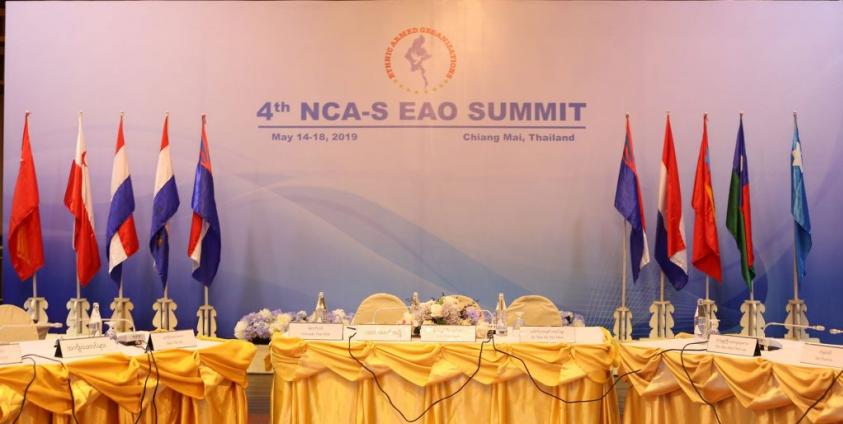Eight Peace Process Steering Team (PPST) members plus other two Ethnic Armed Organizations (EAO), New Mon State Party (NMSP) and Lahu Democratic union (LDU), known as Nationwide Ceasefire Agreement-Signatory-Ethnic Armed Organizations (NCA-S-EAO), altogether numbering some 80 participants were in Chiang Mai for a fourth summit meeting from May 14 to 18 to find ways on how to go about with the stalled NCA-based peace process, but couldn’t make any concrete policy decision.
In retrospect, the fourth summit meeting was later depicted as a first session and vowed to meet again in two months time for a second session to work out a plan on how to cooperate among the EAO better.
The five-point statement released after the NCA-S-EAO meeting on May 18 emphasized the following four points.
- Agreed understanding to overcome the NCA implementation blockage and obstacles, including the drawing up of a systematic plan for the establishment of a federal union, which will be used to negotiate successfully with government and Tatmadaw (Burma army) leaders.
- Regarding the peace process discussion was made that the government, parliament and Tatmadaw should act appropriately to be in tune with the principles of federal union.
- Formation of a working committee to establish peace process implementation group (team) which adhere to non-exclusive principles was carried out.
- The second session of fourth NCA-S-EAO will be convened as soon as possible.
On the same day, May 18, the Karen National Union (KNU) also released a statement emphasizing the virtue and importance of the proposed Peace Process Consultative Meeting (PPCM) formation.
The statement wrote: “To be able to collectively draw up agendas, exchanging of constructive news, and creation of an atmosphere conducive to common aspirations and political goals, including both the signatory and non-signatory EAO consultative peace process meeting through PPCM were proposed by the KNU.”
“We (the KNU) will participate in the two decisions made by the NCA-S-EAO in amendment discussions to overcome the peace process blockage and finding ways to implement the process,” wrote the statement.
The statement further explained that the new setup main tasks are to conduct stage by stage political discussions and finding ways to achieve concrete results in the implementation by conducting political negotiations before 2020 (nationwide election year) and beyond, together with all enthusiastic groups.
Earlier, at the start of the meeting, Restoration Council of Shan State (RCSS) boss Sao Yawd Serk pinpointed the fact that the “non-secession” and “single army” issues, including the Tatmadaw’s professed commitment to protect the military-drafted 2008 constitution to be the main obstacles in peace negotiation process.
KNU chief Mutu Say Poe, on the other hand, explicitly warned that the NCA-based peace process approach is now deviated from its original course and a need to be corrected, if the peace-building and reconciliation are to be on back on track.
Analysis
Given such development, the aim to find a common platform for the non-signatories on how to conduct the stagnated but still barely alive NCA-based peace process has not been fruitful, as all could see.
In a nutshell, the KNU wants to scrap the PPST and replace it with PPCM involving all EAO, signatories and non-signatories alike, and find a common ground to bargain with the civilian-military government. The rest remaining members, with the exception of RCSS, are for the maintenance of the PPST.
Accordingly, insiders said that the KNU real motive in wanting to scrap it is because it felt that the PPST has been manipulated by the government and the military, such as the then PPST representative Padoh Kwe Htoo Win being pressured to sign the two Union Accord agreement guiding principles (of 10 + 10 points) on two occasions during the past two Union Peace Conference, also known as 21st Century Panglong Conference, against his will.
Of course, apart from this, the KNU and RCSS also opted not to continue with the NCA-based peace process starting from last year November, citing unfairness, inequality, differences in interpretation of NCA and in the implementation of the whole peace negotiation process.
The name of the game now is achieving common goal or goals between the civilian-military regime itself and the signatory and non-signatory EAOs to come up with a common bargaining political stance, so that the peace process negotiation can move on and eventually leading to political settlement. Otherwise, all will go on muddling through, as is now the case, without having a clear idea on how peace and reconciliation for the people and country may be achieved.







